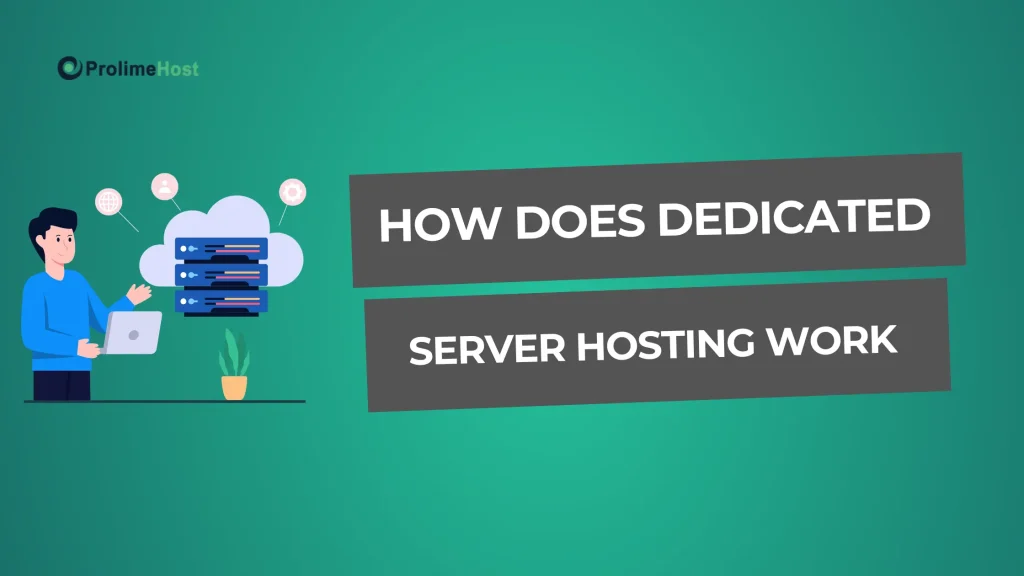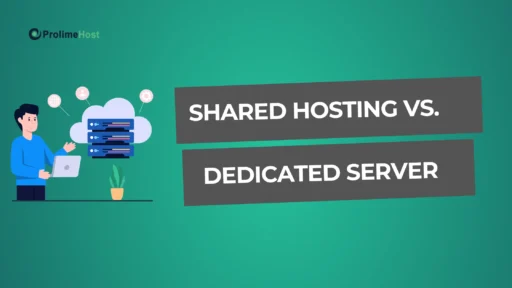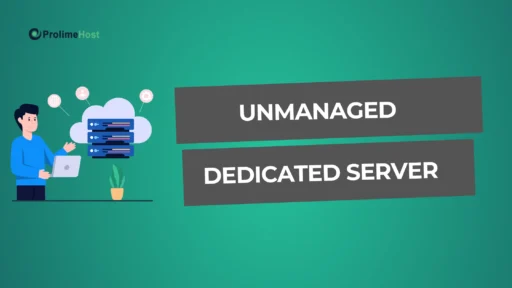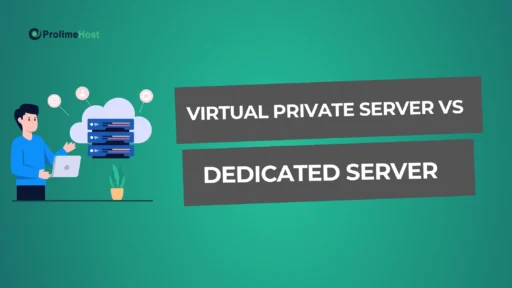
If your website is slow, constantly crashes during peak traffic, or struggles with basic performance even after upgrades it’s likely outgrown shared or VPS hosting. These environments are cost-effective at first, but they’re built for basic needs.
As your business scales, they become bottlenecks: limited resources, poor security, and zero control. Worse, you’re at the mercy of noisy neighbors on the same server, which can drag down your speed or even crash your site without warning.
That’s where dedicated server hosting comes in.
Dedicated servers give you full ownership of a high-performance physical machine. No sharing. No restrictions. You choose your hardware, operating system, security layers, and software stack tailored exactly to your business needs.
Whether you’re running a traffic-heavy eCommerce store, managing sensitive user data, or hosting custom applications, a dedicated server ensures speed, stability, and security at every level.
And the best part? You don’t need to be a tech expert. Providers like ProlimeHost offer fully managed solutions handling everything from setup and monitoring to backups and security patches. So you get enterprise-grade performance without the technical hassle.
Ready to stop compromising on performance?
Choose ProlimeHost and experience hosting built for serious business.
Because when your website is your brand’s first impression downtime isn’t an option.
What is a Dedicated Server?
A dedicated server is a physical server that’s exclusively allocated to one customer. Unlike shared or cloud hosting, you don’t split resources (CPU, RAM, storage) with anyone.
This setup offers more control, performance, and security making it ideal for demanding workloads.
How a Windows Dedicated Server Differs from Linux?
The core difference lies in the operating system, which impacts performance, compatibility, and ease of use:
User Interface: Windows servers offer a familiar GUI, ideal for users comfortable with Windows. Linux is more CLI-driven, suited for developers and sysadmins.
Software Compatibility: Windows supports .NET, MSSQL, and ASP.NET applications. Linux is best for open-source tech like PHP, MySQL, Python, etc.
Licensing: Windows requires paid licenses. Linux (Ubuntu, CentOS, Debian) is open-source and free to use.
Performance & Security: Linux is lightweight and often faster with fewer vulnerabilities. Windows may consume more resources but is easier for GUI-based management.
Use Case Fit: Choose Windows for Microsoft-stack apps. Go with Linux for custom hosting, development, or performance-critical environments.
In short, Windows is plug-and-play, while Linux gives more control and flexibility.
What is a Dedicated Server in Gaming?
A dedicated gaming server is a private, high-performance server used to host multiplayer games:
Low Latency: Ensures smooth gameplay with minimal lag by reducing ping times.
Consistent Performance: No shared resources, so performance stays stable even during peak load.
Customization: Gamers or admins can set rules, mods, and game mechanics without limitations.
Player Capacity: Supports many simultaneous players without crashing or slowing down.
Security: Strong protection against DDoS attacks and cheating.
Popular in competitive esports and community gaming, dedicated servers offer full control, faster speeds, and an enhanced multiplayer experience.
Why Do Businesses Choose Dedicated Servers Over Shared Hosting?
Need more power, control, and security than shared hosting can offer? Go with a dedicated server.
Shared Hosting:
You share CPU, RAM, storage, and bandwidth with others.
It’s cheap and slow, limited, and not secure enough for serious use.
Good for small sites. Not built for growth or high traffic.
Dedicated Servers:
You get the whole machine to yourself.
No sharing. Full control. Guaranteed resources.
Handles big traffic, complex apps, and sensitive data without issues.
Security:
No other users on your server = fewer risks.
Great for finance, healthcare, and e-commerce.
Customization:
Install any OS. Use custom software.
Tweak performance as needed. Shared hosting won’t let you do this.
Other key benefits:
- Dedicated IP (helps with SEO and email)
- Easy to scale as you grow
- Better support with stronger SLAs
Bottom line:
Shared hosting is basic.
Dedicated servers are built for power, privacy, and full control.
How Dedicated Server Hosting Works

Dedicated server hosting gives your business full control over a physical server that’s entirely yours, unlike shared or VPS hosting, where resources are split between multiple users.
With a dedicated server, all the computing power, bandwidth, storage, and memory are reserved exclusively for your websites, applications, or data workloads.
Here’s how it works: you either rent or purchase a server from a hosting provider. That server is housed in a professional data center with high-speed connectivity, power backups, climate control, and advanced security.
From there, you get root-level access to configure the server exactly the way you want, choosing the operating system (Linux or Windows), installing required applications, and setting up firewalls or software environments based on your project needs.
You can manage the server independently or choose managed hosting, where the provider handles system updates, patches, backups, monitoring, and even performance tuning. This is ideal for businesses that want power and flexibility without the maintenance burden.
Dedicated servers are especially valuable for hosting high-traffic websites, large databases, custom applications, or sensitive data that must comply with regulations. They offer unmatched reliability, fast load times, and consistent performance under heavy demand.
In short, dedicated hosting is like owning a high-performance machine in a secure facility; you get complete control, dedicated resources, and peace of mind knowing your data and services are isolated from others. It’s a strategic investment for businesses that demand performance, uptime, and customization.
Key Features of a Dedicated Server
Dedicated servers are packed with powerful features that give businesses complete control, security, and performance. All in one package. Unlike shared or VPS hosting, you’re not splitting resources with anyone. Everything is yours, and it shows in how smoothly things run.
Full Server Management
You get root-level access, meaning you can install software, configure firewalls, and tailor every setting to your exact needs. Managed plans are also available for businesses that want expert support without handling the backend.
Scalability & Performance
As your website or application grows, so can your server. You can upgrade hardware specs, add more RAM or storage, and handle sudden traffic spikes without downtime or lags.
Security & Isolation
With no neighboring users, there’s zero risk of cross-site breaches. You can implement your own security protocols, ideal for handling sensitive data or complying with regulations like HIPAA or GDPR.
Administrative Access
Full control means the ability to set up user roles, permissions, and deploy tools as needed. It’s particularly valuable for dev teams managing staging environments or running custom applications.
OS & Hardware Flexibility
Choose your preferred operating system: Linux, Windows, or others and customize hardware components like CPUs, SSDs, or RAID configurations based on your workload.
Dedicated IP & Control Panels
A dedicated IP improves email deliverability and SEO trust. Paired with intuitive control panels like cPanel or Plesk, managing server tasks becomes easy, even for non-tech users.
All these features make dedicated servers the go-to choice for performance-driven businesses that refuse to compromise on quality.
Pros and Cons of Dedicated Hosting
Dedicated hosting offers unmatched performance and control, but like any solution, it comes with trade-offs that businesses should weigh carefully.
| Pros | Cons |
| Full Resource Control – All server resources: CPU, RAM, and bandwidth are dedicated to your site, ensuring peak performance. | High Cost – More expensive than shared or VPS hosting due to exclusive resource allocation. |
| Enhanced Security – No shared environment means lower risk of malware, breaches, or noisy neighbor issues. | Technical Expertise Required – Unmanaged servers demand advanced knowledge for setup and maintenance. |
| Customization Flexibility – Freedom to install any OS, software, or control panel tailored to your needs. | Limited Scalability (Compared to Cloud) – Scaling hardware requires manual intervention or server upgrades. |
| Better Performance – High uptime and fast load speeds, even during traffic spikes or heavy data operations. | Disaster Recovery Dependence – Requires separate backup and recovery plans, which adds complexity. |
| Unique IP Address – Improves domain reputation, email deliverability, and SEO rankings. | Reliability Concerns if Self-Hosted – If not appropriately managed, downtime or hardware failure can disrupt operations. |
| Ideal for High-Traffic & Mission-Critical Apps – Perfect for eCommerce, SaaS, finance, or healthcare platforms. | Longer Setup Time – Initial configuration takes more time than instant cloud provisioning. |
How to Set Up a Dedicated Server for Your Website
Setting up a dedicated server for your website gives you complete control over performance, security, and customization, but it requires careful steps to get it right.
Choose the Right Server Provider or Hardware
Start by selecting a hosting provider (like Liquid Web or Velia.net) or assemble your own physical server. Consider key specs like CPU, RAM, storage, and bandwidth based on your site’s resource needs.
Install a Server Operating System
Most servers run on Linux (Ubuntu, CentOS) or Windows Server. Your choice will depend on compatibility with your tech stack. Hosting providers usually offer OS installation during provisioning.
Set Up Web Server Software
Install Apache, Nginx, or IIS depending on your OS. These handle HTTP requests and serve your website content to users.
Configure the Server and Secure It
Set up DNS, create users, manage file permissions, and install SSL certificates. Also, configure firewalls, disable unused ports, and install malware protection to secure your server.
Upload Your Website Files
Use FTP, Git, or cPanel to transfer your website files to the server’s root directory (e.g., /var/www/html on Linux).
Connect Your Domain
Update your domain’s DNS records to point to your server’s dedicated IP. This links your website URL to your new hosting environment.
Test & Monitor
Verify that your website loads correctly and test all functions. Use server monitoring tools to track uptime, load, and errors.
With these steps, you gain full control over your hosting environment, making it ideal for businesses that prioritize performance and security.
How to Choose the Right Hosting Provider

To select the right hosting provider is about more than just price, it’s about performance, support, and the ability to scale as your website grows. Here’s what to look for:
Assess Your Needs
Define what your website requires: basic blog, eCommerce platform, or high-traffic application. This helps narrow down whether you need shared hosting, VPS, or a dedicated server.
Evaluate Hosting Options
Opt for a provider that offers a full range of solutions, from entry-level to enterprise-grade. For example, ProlimeHost offers a range of services, from affordable bare-metal servers to fully managed dedicated hosting, ideal for both beginners and large-scale businesses.
Check Uptime and Speed
Reliability is non-negotiable. Look for hosts with a strong uptime SLA (99.9% or higher), optimized servers, and global data centers to minimize latency.
Review Security & Support
Ensure 24/7 support, DDoS protection, firewalls, and regular backups are part of the package.
Compare Pricing Transparently
Look beyond cheap intro offers. ProlimeHost’s pricing is clear, with no hidden charges and quick provisioning, making it trustworthy and efficient.
Plan for Growth
Choose a provider that scales with you. Whether you need to upgrade storage, RAM, or move to a fully managed setup.
Frequently Asked Questions (FAQs)
What Makes Dedicated Servers Better Than Shared or VPS Hosting?
Dedicated servers offer exclusive access to all resources: CPU, RAM, storage, ensuring faster performance, better uptime, and full control. Unlike shared or VPS hosting, there’s no competition for bandwidth or processing power, making it ideal for high-traffic or resource-intensive websites.
Do You Need Technical Skills to Use a Dedicated Server?
Basic technical knowledge helps, especially if you’re managing the server yourself. However, many hosting providers offer fully managed plans, handling everything from setup to security, perfect for businesses that want power without the complexity.
Can You Upgrade or Downgrade a Dedicated Server Later?
Yes. Most providers allow hardware upgrades (like more RAM or better storage) and often support migration to a higher or lower-tier plan. Just ensure your provider offers flexible scaling options before committing.
How Secure is Dedicated Server Hosting?
It’s one of the most secure hosting types. Since no other users share your server, risks from neighboring accounts are eliminated. Plus, you can implement your own firewall rules, SSL configurations, and regular security audits to match your needs.
Conclusion
If you’ve made it this far, one thing is clear, your current hosting might not be doing justice to your website’s potential.
Slow load times, limited control, and unpredictable performance are not just technical issues, they’re business risks. Every second of downtime or delay could mean a lost lead, a frustrated customer, or a missed opportunity.
That’s exactly why businesses move to dedicated server hosting.
It’s not just about having your own physical machine, it’s about having the freedom to shape your hosting environment around your needs. Whether you’re running an online store, a custom app, or a large-scale platform, you deserve a server that works for you, not against you. And when it comes to making that switch seamlessly, ProlimeHost is a provider that gets it right. From setup to scaling, from speed to support, they help you stay focused on growth while they handle the tech.



